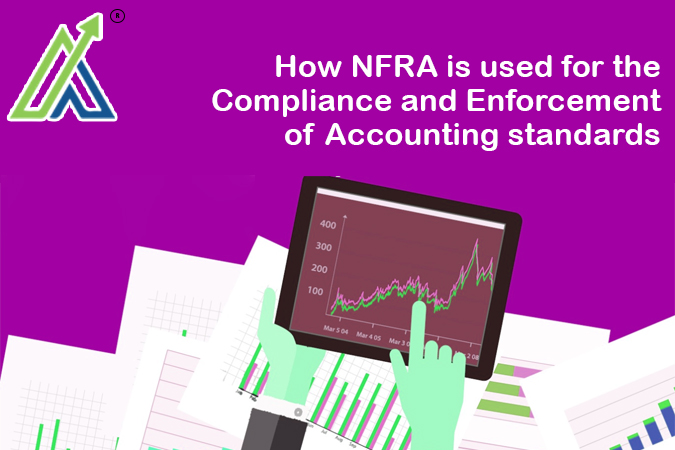Accounting standards are a set of written rules, guidelines, and principles used in India for the preparation of financial statements. These are used uniformly and consistently. For the compliance and enforcement of these accounting standards, the National Financial Reporting Authority (NFRA) plays an important role.
What is meant by NFRA?
The National Financial Reporting Authority (NFRA), under the provisions of Section 132 of the Companies Act, 2013, is a body that is formed and is used to help in the framework made for the enforcement of legislation related to accounting and audits. This authority is helpful in building investor and public confidence in financial reporting.
Role of NFRA
NFRA possesses various responsibilities. It is used to lay the foundation framework for accounting and audit standards, as well as to monitor and enforce them. This authority monitors the quality of the work of professionals (auditors, CFOs, etc.) and improves the quality through its suggestions.
Powers of NFRA
The list of powers that NFRA has is listed below:
- If the prescribed class of CA firms or CAs are included in the misconduct or in professional matters investigated under this authority, no authority can play any part except NFRA in the matter where NFRA initiated the investigation. Such an inquiry may be started suo moto, on its own, or in response to a referral from the Central Government.
- This authority possesses the same powers as the Civil Court under the Code of Criminal Procedure involving the below matters.
- According to the specification made by the NFRA with respect to time and place for the production of books of accounts and other prescribed documents,
- Gathering, persuading, and questioning people as they are sworn in.
- Inspecting books, registers, or documents at any place by any person.
- Issuing commissions for the inspection of documents and witnesses.
If professional or other malpractice is induced, this authority holds the power to punish the fraudulent. –
- Penalty
- A fine of Rs. 1,00,000 to 5 times the fees received for an individual;
- A fine of Rs. 5,00,000 to 10 times the fees received by any firm;
- Disqualifying an individual or firm from ICAI’s membership between 6 months and 10 years, as may be decided.
Any individual who did not find satisfaction in the decision made by NFRA can appeal further to the Appellate Authority.
Benefits of NFRA
Here is the list of the benefits that NFRA provides:
- After refusal, India now qualifies for the International Forum of Independent Audit Regulators (IFIAR). This improves India’s image in the global market and increases confidence for foreign as well as domestic investors.
- More investment from domestic and international resources.
- India’s qualification for IFIAR leads to commitments to business standards that support globalization even more.
- Excelling in the audit industry.
- Development of the economy.
- NFRA provides more resources for the development of more skills for the ICAI in the modern world of technology.
Questions to Understand your ability
Ques1: What’s NFRA stand for?
- National Financial Reporting Authority
- National Finance Review Agency
- National Financial Regulation Authority
- National Fiscal Reporting Agency
Ques2: Under which section of the Companies Act, 2013, does NFRA exist?
- Section 129
- Section 130
- Section 131
- Section 132
Ques3: Who handles CA firm misconduct cases once NFRA steps in?
- SEBI
- RBI
- ICAI
- Only NFRA
Ques4: What’s the penalty NFRA can hit an individual with for malpractice?
- Rs. 1,00,000 to 5 times the fees received
- Rs. 5,00,000 to 10 times the fees received
- Rs. 1,00,000 to 5 times the fees for individuals; Rs. 5,00,000 to 10 times the fees for firms
- No fine, only disqualification
Conclusion
In conclusion, the NFRA is very important for making sure that India’s financial standards are followed. Following standards and the rules that are needed can help with financial reporting by making it clearer and better. The economy grows because buyers have more faith in everything that’s going on.
FAQ’s
NFRA stands for National Financial Reporting Authority, a regulatory body under Section 132 of the Companies Act, 2013, that keeps an eye on accounting and auditing standards in India.
To build trust in financial reports, it sets standards for accounting and auditing, checks to see how well pros follow these rules, and makes sure they are followed.
NFRA has the same powers as a civil court to look into CA firms and people for wrongdoing and can make them present papers and show up for questioning.
Yes, NFRA can slap fines ranging from Rs. 1,00,000 to 5 times the fees received for individuals and Rs. 5,00,000 to 10 times the fees for firms, plus disqualify them from ICAI for 6 months to 10 years.
The NFRA helped India join the International Forum of Independent Audit Regulators (IFIAR) by imposing strict rules for accounting and audits. This improved India’s image around the world.
Anyone unhappy with NFRA’s call can take it up with the Appellate Authority.
India’s image on the world market is improved by NFRA, which brings in more capital, supports globalization, improves the audit industry, and helps the economy grow.
NFRA provides the framework that leads the ICAI’s expert members to improve their skills in the modern world of technology.

